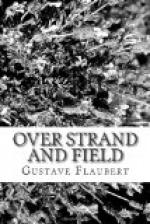There is a window, a large window that looks out into a meadow called la prairie des chevaliers. It was there, from a stone bench carved in the wall, that the high-born dames of the period watched the knights urge their iron-barbed steeds against one another, and the lances come down on the helmets and snap, and the men fall to the ground. On a fine summer day, like to-day, perhaps, when the mill that enlivens the whole landscape did not exist, when there were roofs on the walls, and Flemish hangings, and oil-cloths on the window-sills, when there was less grass, and when human voices and rumours filled the air, more than one heart beat with love and anguish under its red velvet bodice. Beautiful white hands twitched with fear on the stone, which is now covered with moss, and the embroidered veils of high caps fluttered in the wind that plays with my cravat and that swayed the plumes of the knights.
We went down into the vaults where Jean V was imprisoned. In the men’s dungeon we saw the large double hook that was used for executions; and we touched curiously with our fingers the door of the women’s prison. It is about four inches thick and is plated with heavy iron bars. In the middle is a little grating that was used to throw in whatever was necessary to prevent the captive from starving. It was this grating which opened instead of the door, which, being the mouth of the most terrible confessions, was one of those that always closed but never opened. In those days there was real hatred. If you hated a person, and he had been kidnapped by surprise or traitorously trapped in an interview, and was in your power, you could torture him at your own sweet will. Every minute, every hour, you could delight in his anguish and drink his tears. You could go down into his cell and speak to him and bargain with him, laugh at his tortures, and discuss his ransom; you could live on and off him, through his slowly ebbing life and his plundered treasures. Your whole castle, from the top of the towers to the bottom of the trenches, weighed on him, crushing, and burying him; and thus family revenges were accomplished by the family itself, a fact which constituted their potency and symbolised the idea.
Sometimes, however, when the wretched prisoner was an aristocrat and a wealthy man, and he near death, and one was tired of him, and his tears had acted upon the hatred of his master like refreshing bleedings, there was talk of releasing him. The captive promised everything; he would return the fortified towns, hand over the keys to his best cities, give his daughter in marriage, endow churches and journey on foot to the Holy Sepulchre. And money! Money! Why, he would have more of it coined by the Jews! Then the treaty would be signed and dated and counter-signed; the relics would be brought forth to be sworn on, and the prisoner would be a free man once more. He would jump on his horse, gallop away, and when he reached home he would order the drawbridge hoisted, call his vassals together, and take down his sword from the wall. His hatred would find an outlet in terrific explosions of wrath. It was the time of frightful passions and victorious rages. The oath? The Pope would free him from it, and the ransom he simply ignored.




